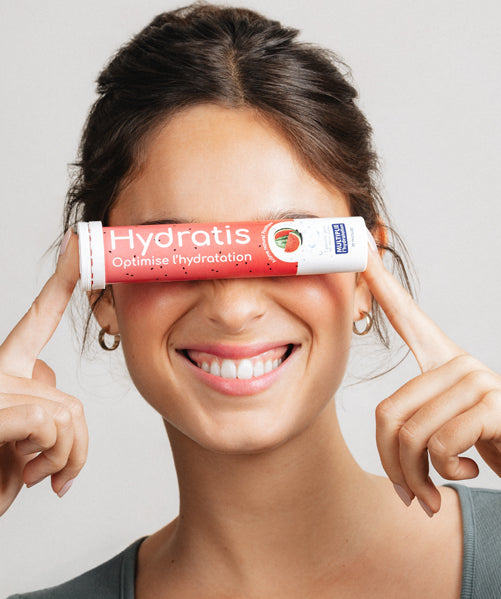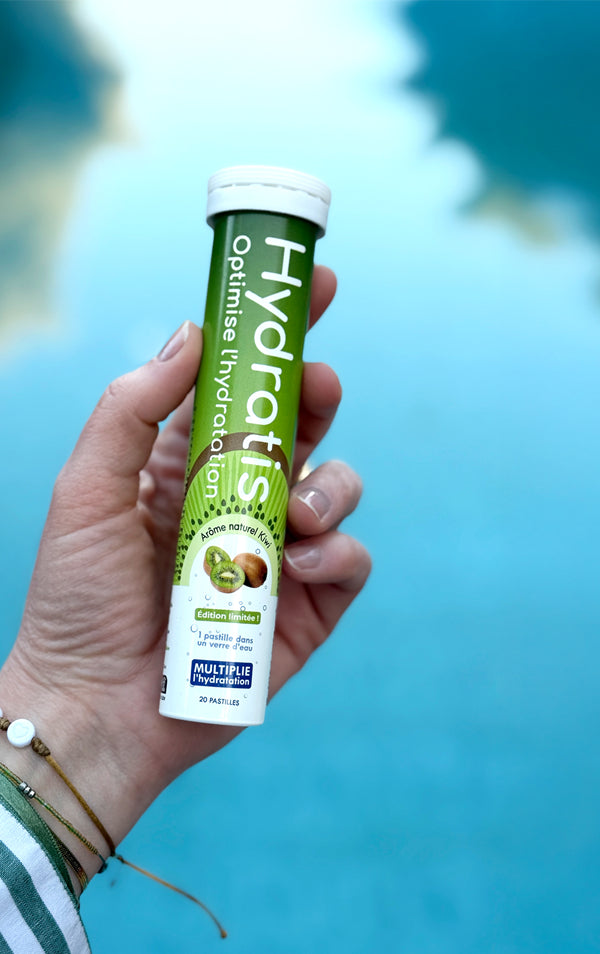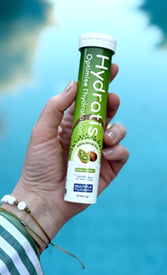Proper hydration in winter is just as important as in warm weather . Contrary to popular belief, the cold doesn't spare your body from water depletion , and the risk of dehydration is just as high.
Indoor heating and the extreme drop in outside temperature dry out the air and cause water loss in the skin and mucous membranes.
These cold-related consequences can have a real impact on your well-being. They weaken your health, cause dry skin , and increase your vulnerability to winter infections .
Discover in this article why drinking well in winter is essential, the benefits it provides and tips for maintaining good hydration in cold weather .
Why is hydration essential in winter?
Many people believe that the body needs less water in winter than in summer. However, dry air, heating, and low temperatures contribute to silent dehydration.
Indeed, since perspiration is less noticeable and the sensation of thirst is less frequent, the body redirects blood flow to the internal organs. This adaptation can give a false impression of being well hydrated.
To maintain a stable internal temperature and effective immune defenses , sufficient water consumption is recommended.

What are the signs of dehydration to watch out for in winter?
In cold weather, even when you don't feel thirsty, you should pay attention to your body's hydration level. Certain signs will alert you if you are experiencing significant fluid loss . These include:
- With a dry mouth ;
- Chapped lips ;
- Of intense and unusual fatigue ;
- Headaches ;
- Dark and scanty urine .
A simple tip to maintain your health is to monitor the color of your urine . If your urine is darker than usual , it means you are dehydrated and you need to adjust your water intake accordingly.
What are the benefits of good skin hydration in winter?
Staying properly hydrated during the winter season offers numerous benefits for the skin and the body in general. It helps to:
- Preserve skin elasticity and suppleness ;
- Strengthen the skin barrier against cold and dry air;
- To limit tightness and dryness of the skin ;
- Maintaining thermal balance in the face of cold;
- To support the overall functioning of the body, particularly the internal organs;
- Preventing cold-related fatigue ;
- Maintain scalp health and hydration and prevent hair breakage ;
- Ensure complementarity between internal and external hydration ( creams, treatments ).
What foods and drinks should we prioritize to stay hydrated during the winter months?
To stay properly hydrated during the winter season, the choice of liquids to consume is a crucial aspect.
Hot drinks to maintain hydration
Hydration in winter also involves consuming warm drinks that are comforting, while providing water to the body.
Soups , broths, herbal teas, and infusions are excellent options. These flavored waters allow you to vary your fluid intake.
Fruits and vegetables rich in water and minerals
Consuming fruits and vegetables rich in water contributes to hydration in winter while providing essential vitamins and minerals . Approximately 20 to 30% of the water consumed daily comes from these foods.
Citrus fruits ( lemon, grapefruit, clementine, etc.), apples , cabbage , carrots, and pumpkin naturally provide water to the body. Incorporating these foods into your diet is a simple first step to staying well-hydrated.
The importance of electrolytes
For athletes and people who engage in physical activity , it is advisable to supplement their diet with an electrolyte drink , especially if the effort leads to a significant loss of mineral salts, particularly sodium , which is present mainly in sweat .
Electrolytes , such as sodium , potassium , and magnesium , help the body retain water more effectively. They help support muscle function and maintain proper hydration, even in winter.
What practical tips can help you remember to drink regularly in winter?

Staying hydrated in winter requires some planning , especially when thirst is less of an issue. Here are several tips to help you drink regularly:
- Set yourself a clear daily goal (e.g., 1.5 L of water or more depending on daily activities);
- Keep a water bottle or flask close at hand at the office, at home or when traveling;
- Drink a glass of water with each meal and snack;
- Use an app or a reminder on your phone to remember to drink;
- Vary the hot , sugar-free liquids (herbal teas, infusions, broths) to encourage people to drink;
- Regularly consume fruits and vegetables rich in water such as citrus fruits, apples, cabbage or pumpkin;
- Add mineral -rich fluids during intense physical activities ( running , cycling , weight training, etc.) to compensate for mineral loss;
- Incorporate "hydration" breaks into the daily routine after each work session or exercise session;
- Monitor the color of her urine (a simple indicator of her hydration status).
How to hydrate your skin in cold weather?
To hydrate your skin during cold weather, here are some simple and effective steps to adopt:
- Apply a rich moisturizing cream daily ;
- Opt for oils or balms for sensitive areas (lips, hands);
- Humidify the indoor air with a bowl of water or a humidifier;
- Wear soft, non-irritating clothing to limit skin water loss and protect the skin from the cold.
FAQs about hydration in winter
Should we drink as much water as in summer?
Yes, because water losses are real even if they are less visible than in summer.
Do coffee and tea hydrate you?
Yes, coffee and tea contribute to hydration, but they should be consumed in moderation, respecting the recommended daily doses.
Can water be replaced with soups or infusions?
Yes, it's possible to replace water with soups, broths, and herbal teas. They provide water to the body and help maintain good hydration. However, it's still important to drink water daily.
What are the risks of remaining dehydrated?
Insufficient hydration can lead to chronic fatigue, decreased immunity, marked dry skin and concentration problems.
Hydration in winter: what to remember?
Hydration is just as important in winter as in summer. Drink water regularly and consume hot drinks. Rich in fluids , and incorporating hydrating fruits and vegetables helps to support the functioning of the body.
It is also helpful to supplement water intake with external care , such as creams and balms for sensitive areas.
By following these recommendations, you can maintain healthy hydration in winter, protect your skin and preserve your health.
Bibliography
Zhang, J., et al. (2025). Seasonal fluctuation of total water intake and hydration status among young men and women: a prospective cohort study . Frontiers in Nutrition, 11 , 1463501. https://doi.org/10.3389/fnut.2024.1463501
Tanaka, S., et al. (2020). Seasonal variation in hydration status among community-dwelling elderly in Japan . Geriatrics & Gerontology International, 20 (11), 1072–1076. https://doi.org/10.1111/ggi.14009
Uchegbulam, I., et al. (2022). Effect of seasonal change on the biomechanical and physical properties of skin . Skin Research and Technology, 28 (6), 1011–1017. https://doi.org/10.1111/srt.13147
Malisova, O., et al. (2015). Evaluation of drinks contribution to energy intake in summer and winter . Public Health Nutrition, 18 (15), 2851–2857. https://doi.org/10.1017/S1368980014003123
Wu, YF, et al. (2021). Effect of the seasonal adaptability on carbohydrate-electrolyte beverage on post-exercise rehydration . Journal of the International Society of Sports Nutrition, 18 (1), 8. https://doi.org/10.1186/s12970-021-00448-4
Presse, N., & Ferland, G. (2010). Risk factors contributing to insufficient water intake in elderly living in nursing homes and long-term care units: a review of the literature . Canadian Journal of Dietetic Practice and Research, 71 (4), e94–e99. https://doi.org/10.3148/71.4.2010.206
Agner, T., et al. (1989). Seasonal variation of skin resistance to irritants. Contact Dermatitis, 20(6), 367–371. https://doi.org/10.1111/j.1600-0536.1989.tb01961.x






